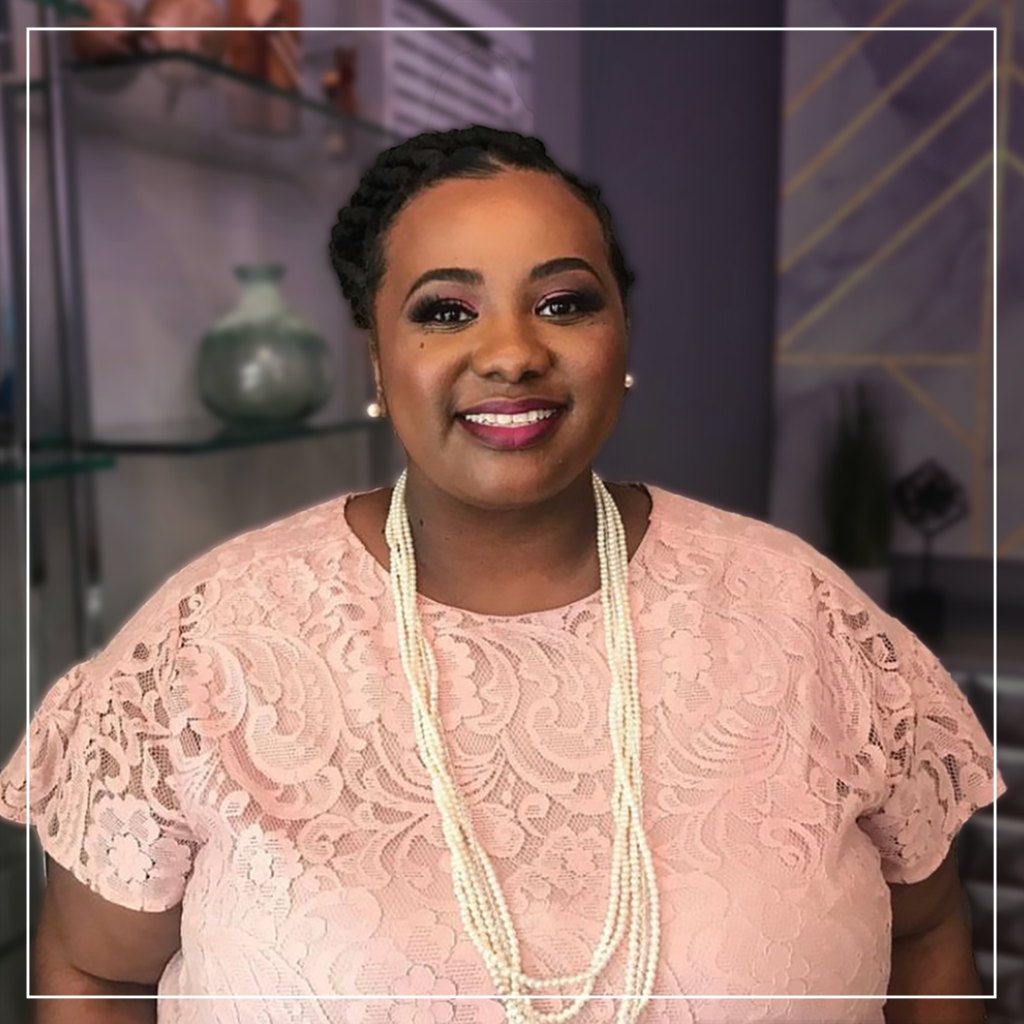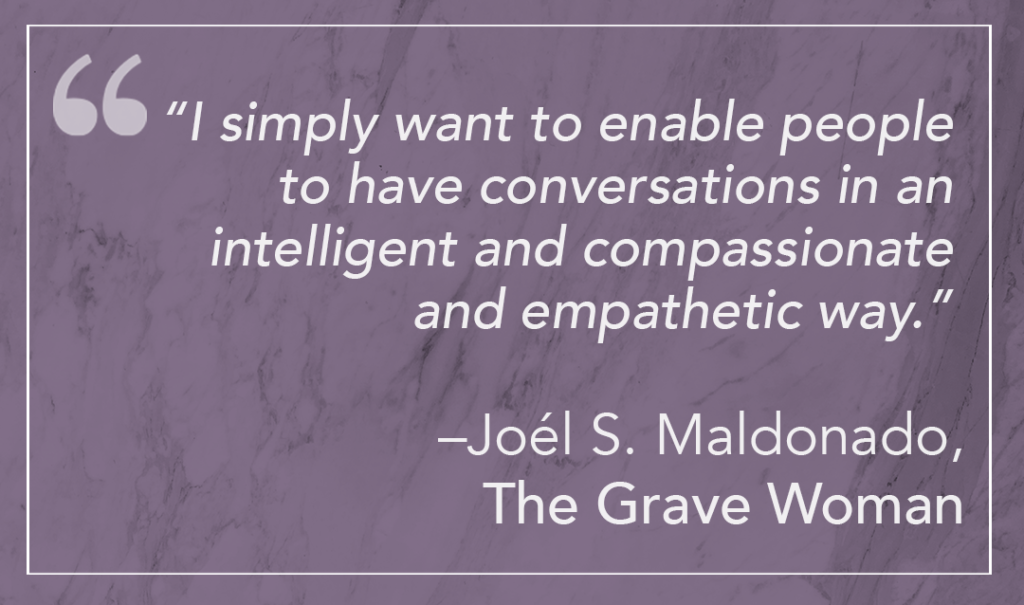Home > THE GRAVE WOMAN: ADDRESSING DEATHCARE INEQUITIES WITH COMPASSION
THE GRAVE WOMAN: ADDRESSING DEATHCARE INEQUITIES WITH COMPASSION
by Loren Talbot
Joél S. Maldonado grew up in a communal space, one where death and dying were not kept from children. “We were a part of the grieving process, the mourning process, funeralization, and burial,” Joél says. “My mothers and my grandmothers and my aunts, and all of the elderly women in my community, went and took care—basically doulaing—for those that were dying in nursing homes.” Her uncle was a mortician and Joél was “morbidly curious.” At 7 years old she started hanging around the funeral home and fell in love with the work her uncle was doing. “He taught me the sacredness of space, and I fell into a love and fascination with caring for people at the end of their life.”
In 2011, Joél went to mortuary school and quickly recognized that a large part of the curriculum was missing from the textbooks. While teaching future morticians how to care for the deceased, the text talked only about how to care for White bodies. There was no mention of Black hair care or makeup or other aesthetics, such as smells and sounds that may be important. “They do not teach us how to take care of BIPOC individuals, particularly Black people at the end of our lives, whether it be from ways to address us in end-of-life spaces,” Joél says. “So many families are traumatized about going to viewings or funerals and not seeing their loved ones, but someone else’s interpretation of what we should look like. That is not acceptable.”
So rather than keeping her thoughts to herself, Joél felt moved to do something about the lack of culturally appropriate teachings.

Called to Teach
Hailing from a family of educators—her grandfather had a PhD and was a college professor, her grandmother had a master’s degree in the ’60s, her mother was an educator, and her father was a veteran—Jóel always had access to education and information and was “taught to think for myself.” That fueled her desire to teach others what they don’t know in this space.
Led by obedience to what she believes to be Spirit, Joél states, “I think we’re each born with something in our basket that equips us to do something on this earth, and this is what happens to be in my basket.” This calling led to an offering of online classes, public speaking, podcasting, a petition to change the racist language in mortuary science textbooks, and teaching anyone she crosses paths with both within the industry and outside of it. Through her vulnerability and her willingness to listen to questions and to confront racism at a root level, Joél is shifting how people are thinking about racial inequities after death.
A Self-Fulfilling Prophecy
When Joél was in mortuary school, she started a blog called The Grave Woman. She explored the questions that have been with her since she stood alongside her uncle helping in the funeral home. “Why are we looking at this person in this box? Who did their makeup? They’re not in their body, and the body is just a vessel or a show. So where do they go? Where does their spirit go, or where does their essence go? I’ve always really been curious about those things, and I’m still curious about those things.”
Joél didn’t know where she came up with the name for her blog, but her grandmother knew. She had saved a self-portrait that Joél had drawn at 8 years old. In it, she had drawn herself wearing red lipstick, standing in a cemetery, talking into a microphone—with the words “I am the Grave Woman”.

Addressing Death Inequities
As The Grave Woman, Joél stepped into the space as a teacher on deathcare and caring for bodies postmortem, all from the perspective she can speak from. Joél is dedicated to teaching and to remaining teachable. She speaks to the fact that the deathcare space is “as diverse as each of us; it’s as diverse as each and every person that occupies it. There is no cookie cutter. You don’t have to show up and be me. I don’t have to show up and be you.”
This has led to Joél offering classes both around what was missing in her textbooks to the larger inequities in deathcare. This February she is launching three new classes specifically focused on Black hair care. Other offerings include Surviving Mortuary School, Racism in Death Care, Spiritual Death Care, and 10 Tips for Succeeding in Mortuary School. Joél offers insight into the death culture stemming from the Gullah Geechee community in which she was raised. She often coteaches with her husband, who offers another lens from his upbringing with Baha’i traditions.
“It is important to have an understanding why certain communities have hesitation to work with nonethnic providers—historical, personal experiences that may have led to that hesitation,” says Joél, adding that she addresses how to overcome those barriers through conversations with family. “I simply want to enable people to have conversations in an intelligent and compassionate and empathetic way that allows for that anxiety to dissipate a little bit and allow understanding of cultural and faith-based differences.”
With over 19,500 subscribers on YouTube and a combined 10,000 TikTok, Instagram, Facebook, and podcast followers, The Grave Woman is engaging others in these conversations. Her TikTok videos are an amazing introduction into her work, featuring fun information, insights into the inequities within the deathcare industry, and empowering facts about deathcare.
Today she is invited to speak to governmental agencies, funeral industry groups, and classes on navigating conversations on death and dying. “Now there are instructors that have invited myself, other people of color, and other people in to have conversations specifically about inequity at end of life and caring for Black bodies. But it’s not a part of the standard curriculum,” Joél says.
On Compassion
While The Grave Woman’s program in mortuary school didn’t include a class on compassion or human connection, the curriculum did include mock funeral arrangement conferences. Each student is given different scenarios to act out and explore how to handle. She was able to role-play a scenario in which a man had recently lost his wife. Being the “touchy-feely person” she is, Joél’s inclination was to comfort him, including by holding his hand. She quickly learned that could be perceived as inappropriate.
“I never would have thought that was inappropriate,” she says. “I’m like, ‘Oh my God! I’m just trying to comfort you,’ so for me that class was a blessing. Funeral professionals are extremely compassionate, and there are conversations here around if the assumptions we’re making are always good…conversations around boundaries with compassion, not necessarily how to be more compassionate.”
And that compassion is innate for Joél. Through her teachings and outward-facing mission to change the conversation, she encourages all of us to show up as our authentic selves. “I think it’s a blessing that we have in this space to live life backwards… It truly fueled me to try to live by the Golden Rule. Treat people the way I want to be treated. Tell people how I feel. Be honest. It’s made me very protective of my reputation. Like I want to be who I present to be like. I don’t want you to meet me and then somebody else meets a different me.” And in the end, it is with that same authenticity and compassion that Joél shows up as a funeral director.
“We get to tell the most amazing stories. At the end of life we get to experience one another’s journey,” she says. “And to me, I found when people are at that point, and when people are mourning and grieving the loss of someone that they love, you meet who they really are.”
